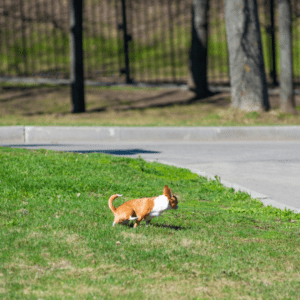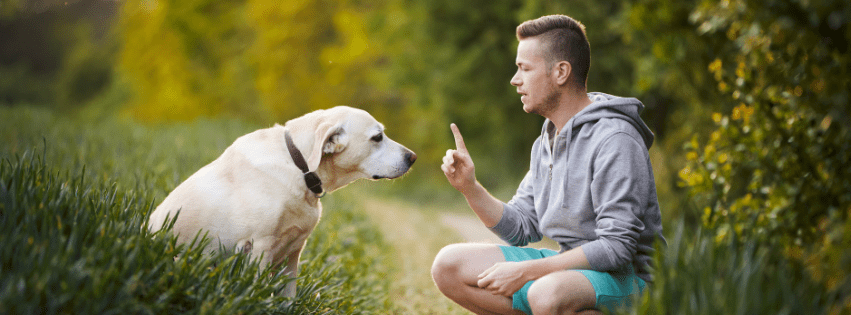Maintaining a lush, green lawn here in Northern Florida can sometimes be challenging. From the warmer temperatures to the occasional summertime storm and more, there are a variety of things vying to keep your lawn down for the count. Another problem facing homeowners is the damaging effects of dog urine. Unless you own a canine, you might not have been aware that their urine contains concentrated amounts of nitrogen. This can result in unsightly burn patches on your lawn. Today, we wanted to go over some effective strategies to protect your lawn from dog urine damage.
First, why does dog urine kill lawns?
As we mentioned just now, dog urine contains high levels of nitrogen. This chemical can overwhelm the grass and soil. Over time, this creates what looks like burn patches. This discoloration will form gradually until it creates an unsightly stain on your otherwise gorgeous lawn.
So why is this an issue? See, when dogs urinate on the same spot repeatedly, the nitrogen concentration increases. This leads to more severe damage that builds upon already existing problems. Additionally, the alkaline pH of dog urine can further stress the grass, making it more susceptible to damage.
What can a pet owner do? Here are a few tips designed to shield your lawn from urine damage.
Train your dog
One of the most effective ways to protect your lawn from dog urine damage is to train your furry friend to urinate in designated areas. This can significantly reduce the impact of dog urine throughout your lawn. In essence, you’re containing the damage to just one area instead of allowing your four-legged friend to do their business wherever they please. This can shield your lawn from dog urine damage and allow you to focus your repair efforts on a single area.
What are some ways to train your dog? We’re glad you asked!
Remember, consistency is key. Establish a consistent routine for your dog’s bathroom breaks, and stick to it as much as possible. Take your dog to the designated potty area at regular intervals throughout the day, especially after meals and before bedtime.
Also, be sure to use positive reinforcement. When your dog urinates in the designated area, be sure to praise and reward them immediately. Positive reinforcement helps reinforce the desired behavior and encourages your dog to continue using the designated spot.
Most importantly, be patient. Training takes time and patience, so don’t get discouraged if your dog doesn’t catch on right away. Continue to reinforce the desired behavior consistently, and be patient as your dog learns and adjusts to the new routine.

Consider changing their diet
That’s all well and good, but are there other things you can do? In fact, there are. Another approach to reducing the impact of dog urine on your lawn is to modify your dog’s diet. Certain dietary supplements have been known to help neutralize the nitrogen in your dog’s urine, making it less harmful to your lawn.
If supplements aren’t your thing, or you’re worried about their impact on your dog’s overall health, consider switching to a dog food that is specifically formulated to reduce urinary nitrogen levels. These foods often contain ingredients such as cranberry extract or dl-methionine, which can help lower the nitrogen content of your dog’s urine.
Another idea is to encourage your dog to drink more. By increasing their water intake (such as adding water to their food or providing multiple water bowls throughout your home), one theory is that you’ll be diluting your dog’s urine. It’s the same idea with us and dehydration: the more water we drink, the healthier our bodies are and the cleaner our urine.
Install hardier grasses
Perhaps the damage has already been done and you’re looking for a way to mitigate future issues. Choosing the right type of grass for your lawn can make a significant difference in its ability to withstand dog urine damage. Consider replacing your existing grass with hardier varieties that are more resistant to nitrogen burn. Your lawn care professional can go over your options, including ones that are both beautiful and hardy.
Regular lawn maintenance
Another way to shield your lawn from dog urine damage is regular lawn maintenance. Not only is this wise for your lawn’s overall health, but it can truly work to overcome this persistent battle with this type of yard issue.
Here are some general maintenance tips to get you started:
- Water your lawn regularly to encourage deep root growth and minimize the effects of dog urine. Watering in the early morning is ideal, as it reduces evaporation and ensures that the water penetrates deeply into the soil.
- Mow your lawn regularly at the appropriate height for your grass type. Taller grass blades can help shade the soil and retain moisture, making it less susceptible to damage from dog urine.
- Aerate your lawn annually to improve soil drainage and reduce compaction. This allows water and nutrients to reach the roots more effectively, promoting healthier grass growth.
- Overseed bare or damaged areas of your lawn with a grass seed blend that is suitable for your climate and soil type. This helps fill in thin spots and promotes uniform grass coverage, reducing the visibility of dog urine damage.
The best way to protect your lawn from dog urine
Of course, the best way to protect your lawn from dog urine is to work with a lawn care professional. They can both ensure that your yard looks great as well as proactively work to prevent permanent issues with it. Shielding your lawn from dog urine damage is an ongoing battle. This is another reason why a firm such as Sun Power Lawn Care is a great idea for the busy Gainesville homeowner.
Not only can we save you time by taking care of your lawn for you, but we can also ensure that — if we see any early warning signs of dog urine damage — our team members stay on top of it.
Would you like to get a free quote for our services? Then send us a message here or call our sales offices today at (352) 507-5296!
Here are some great resources to help your lawn look its best:
When Is the Best Time to Water Your Lawn: A Watering Schedule Guide
When to Fertilize a Lawn: A Seasonal Guide for Optimal Turf Nutrition

